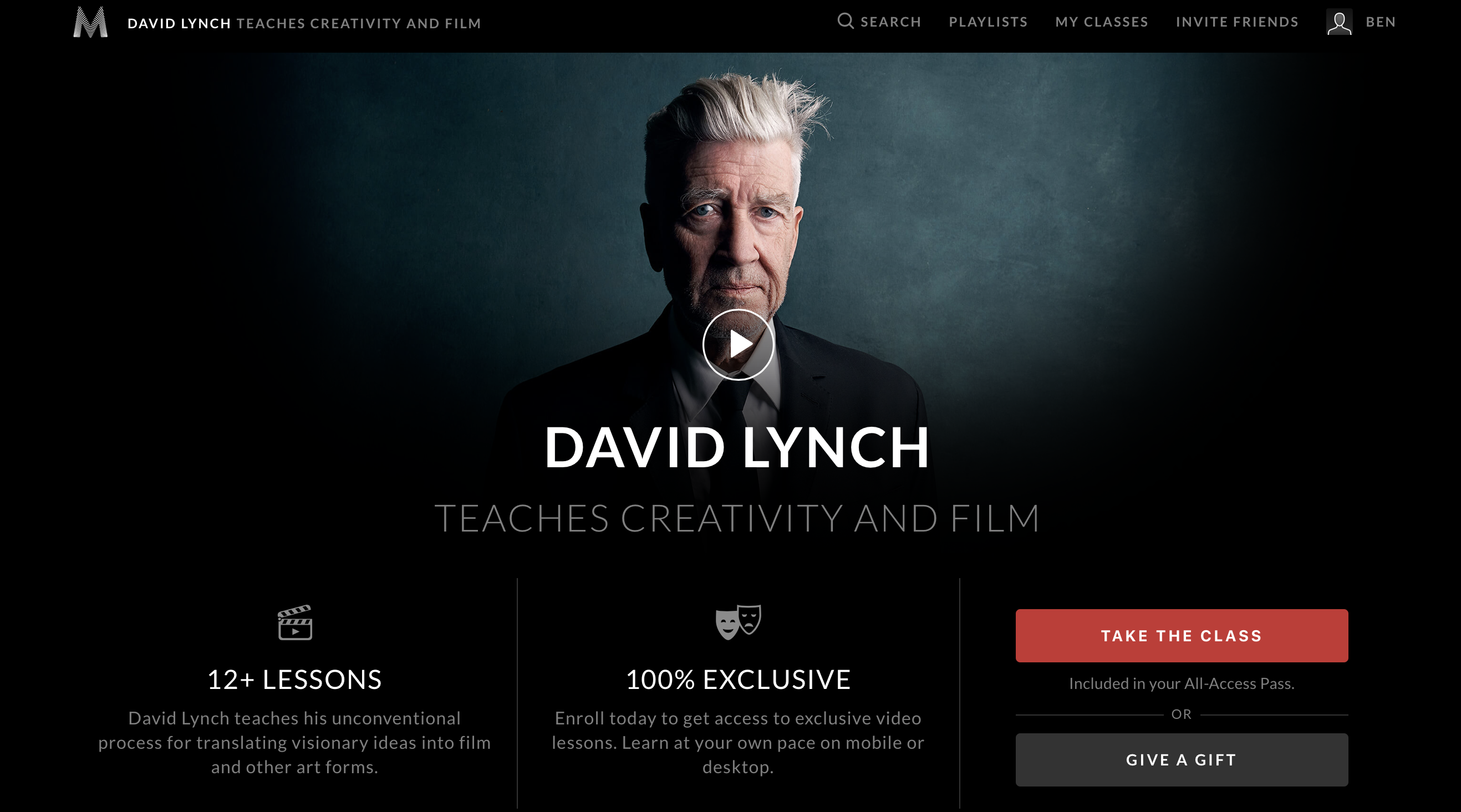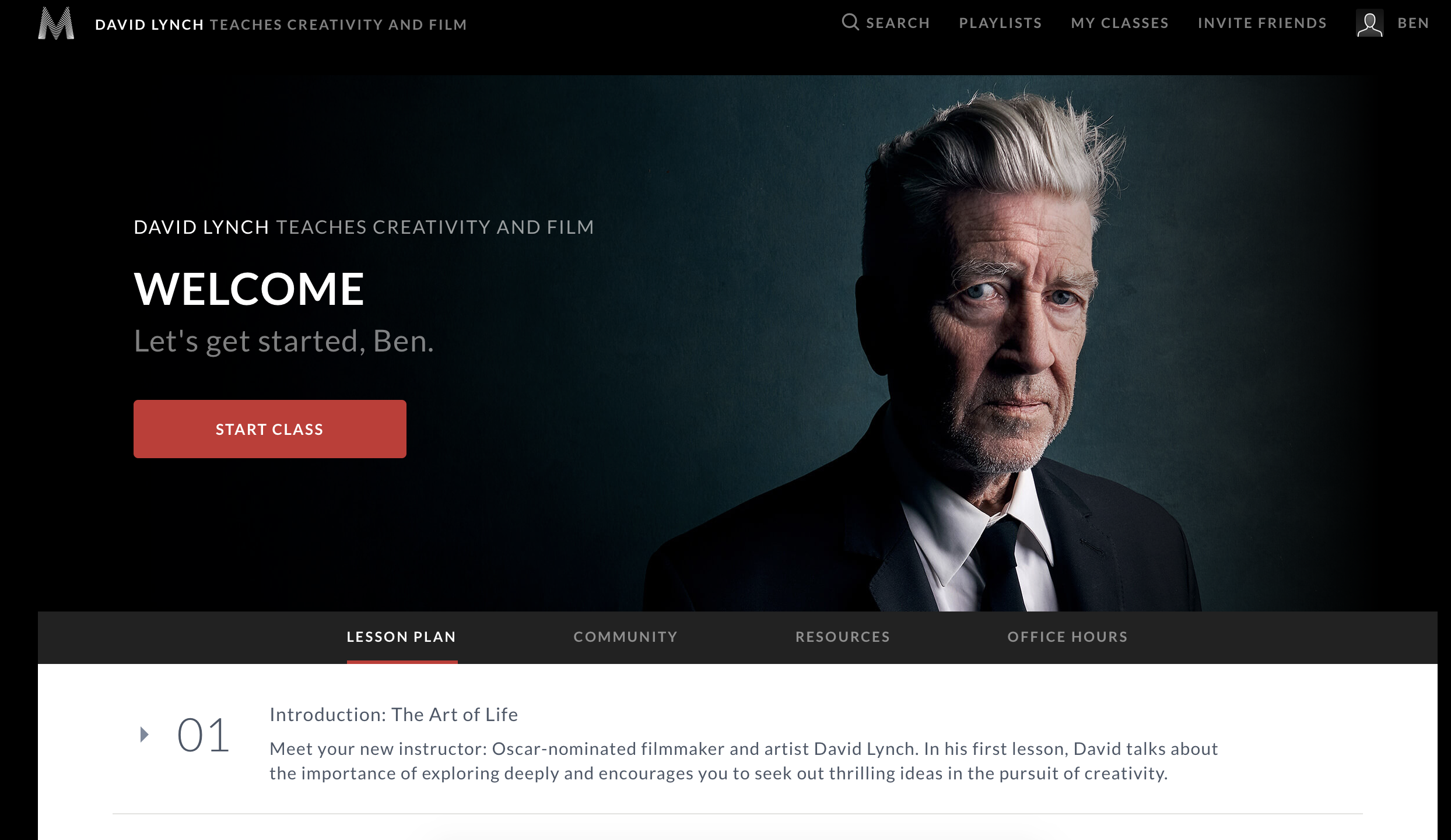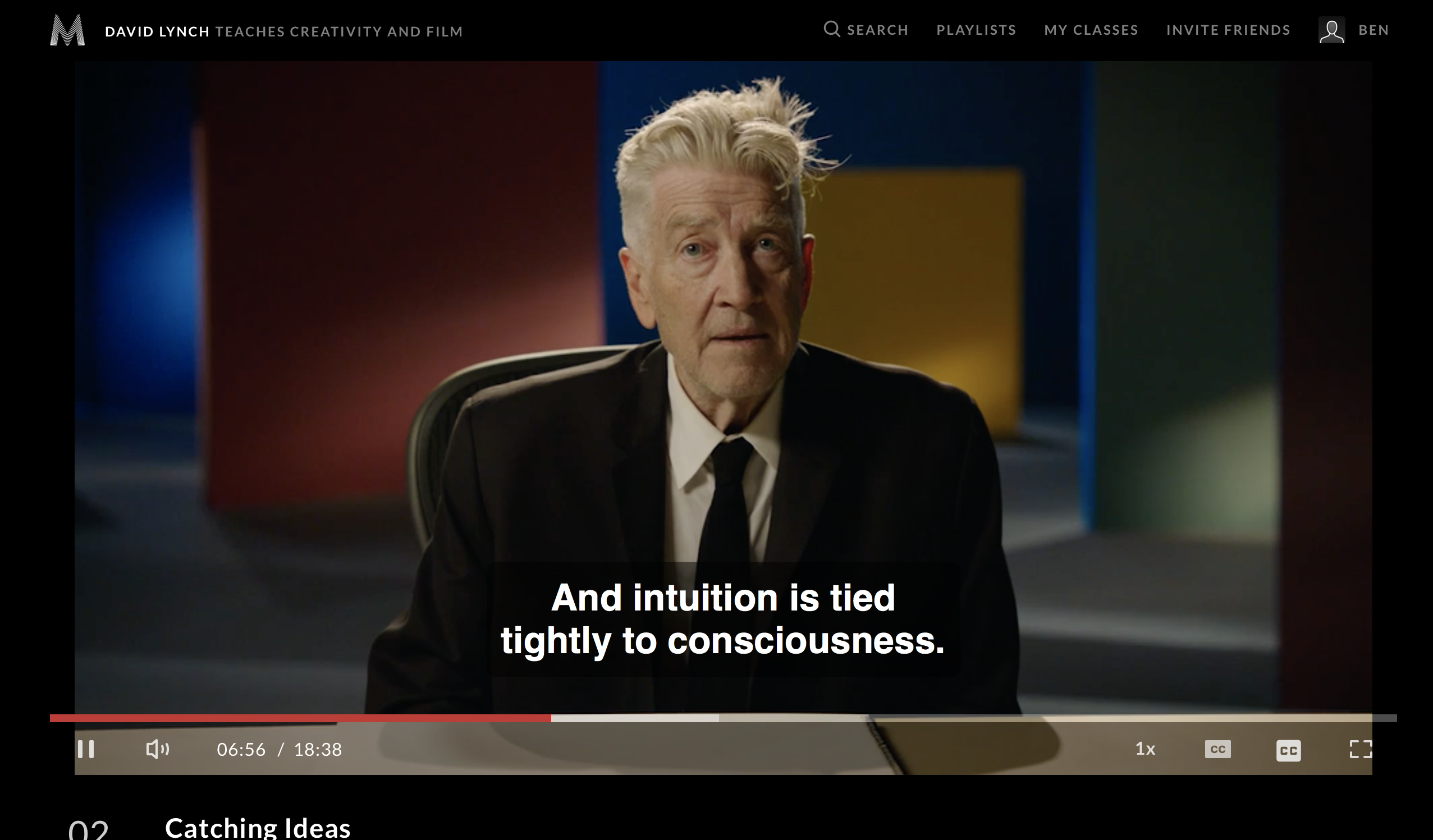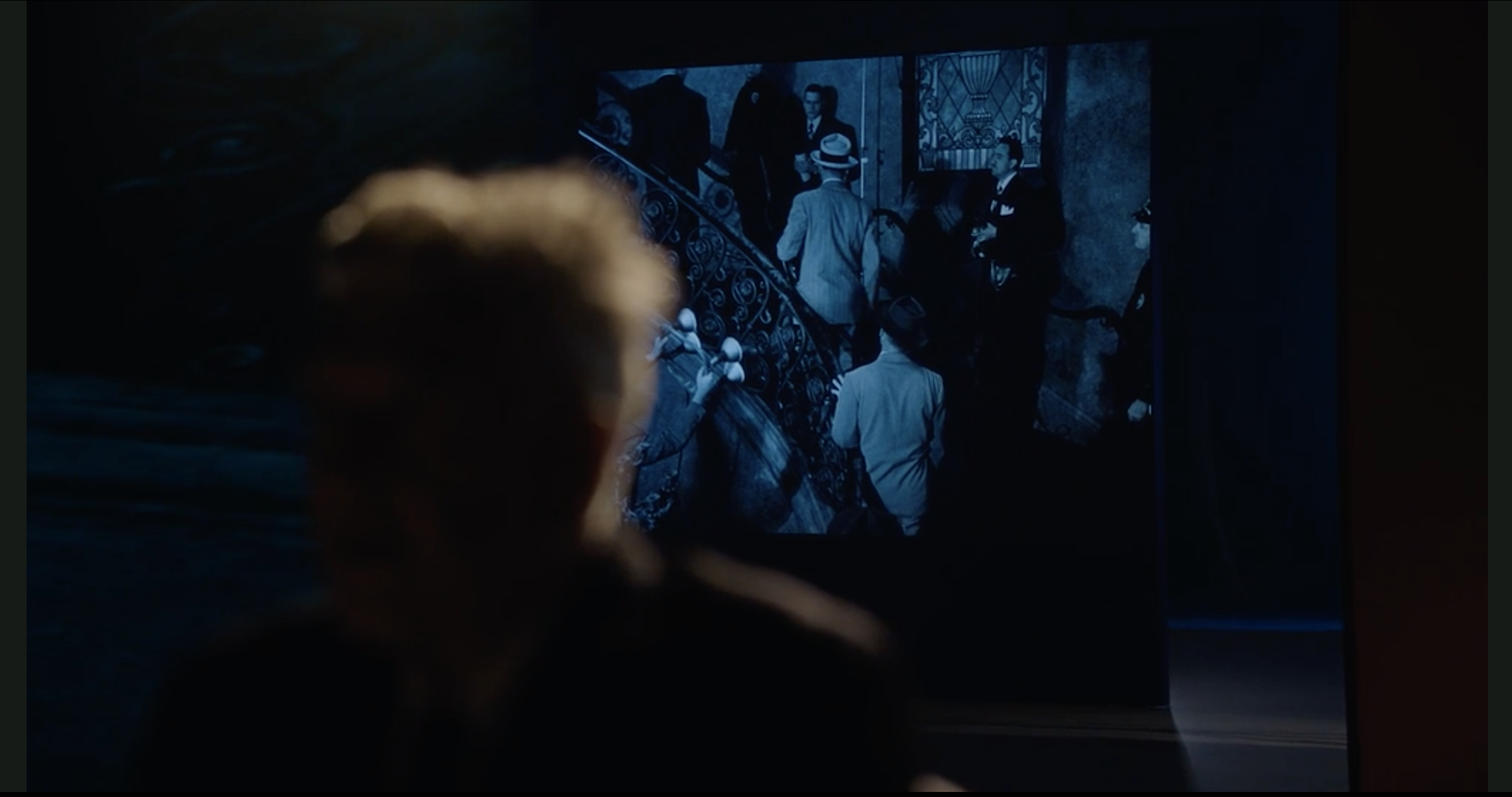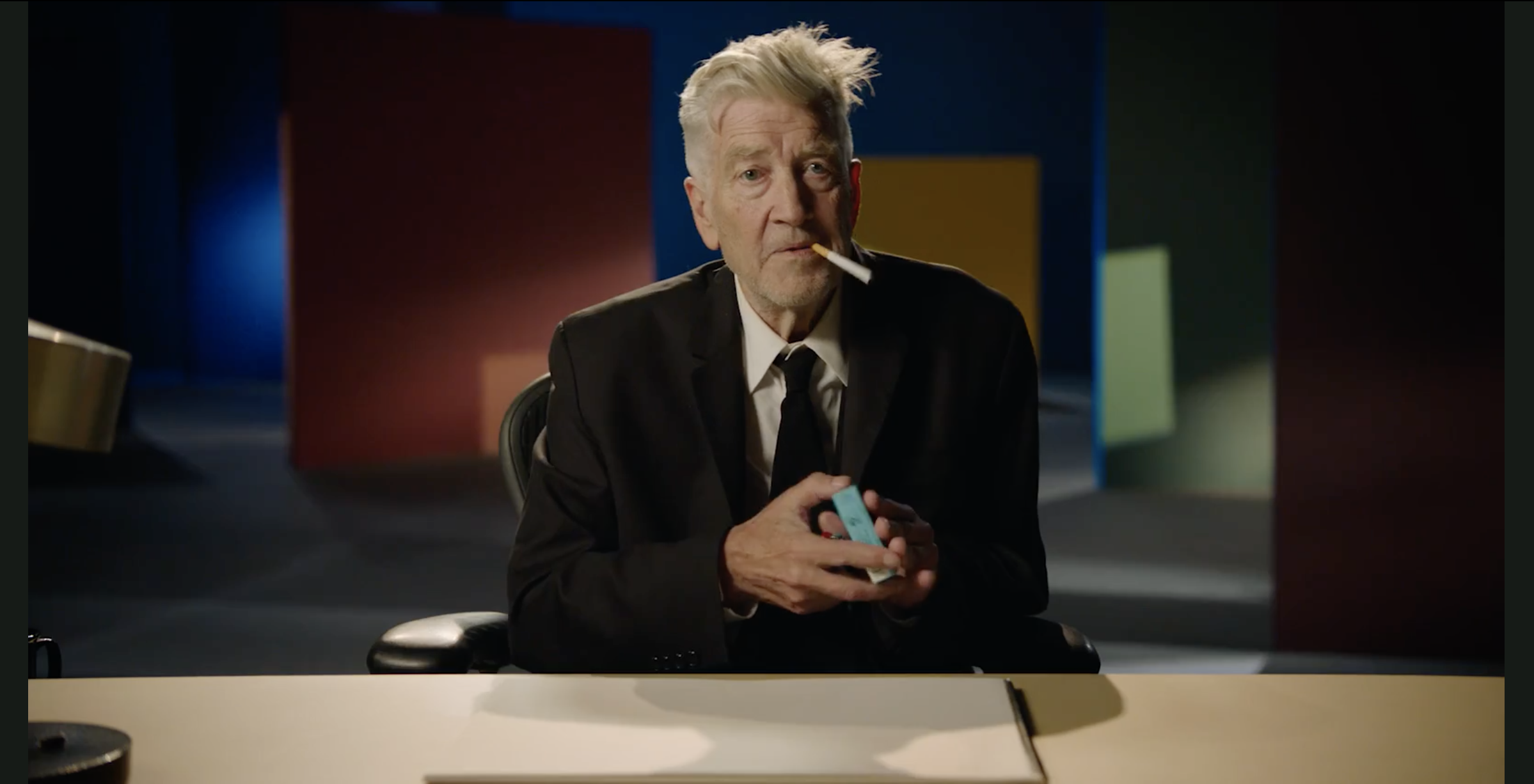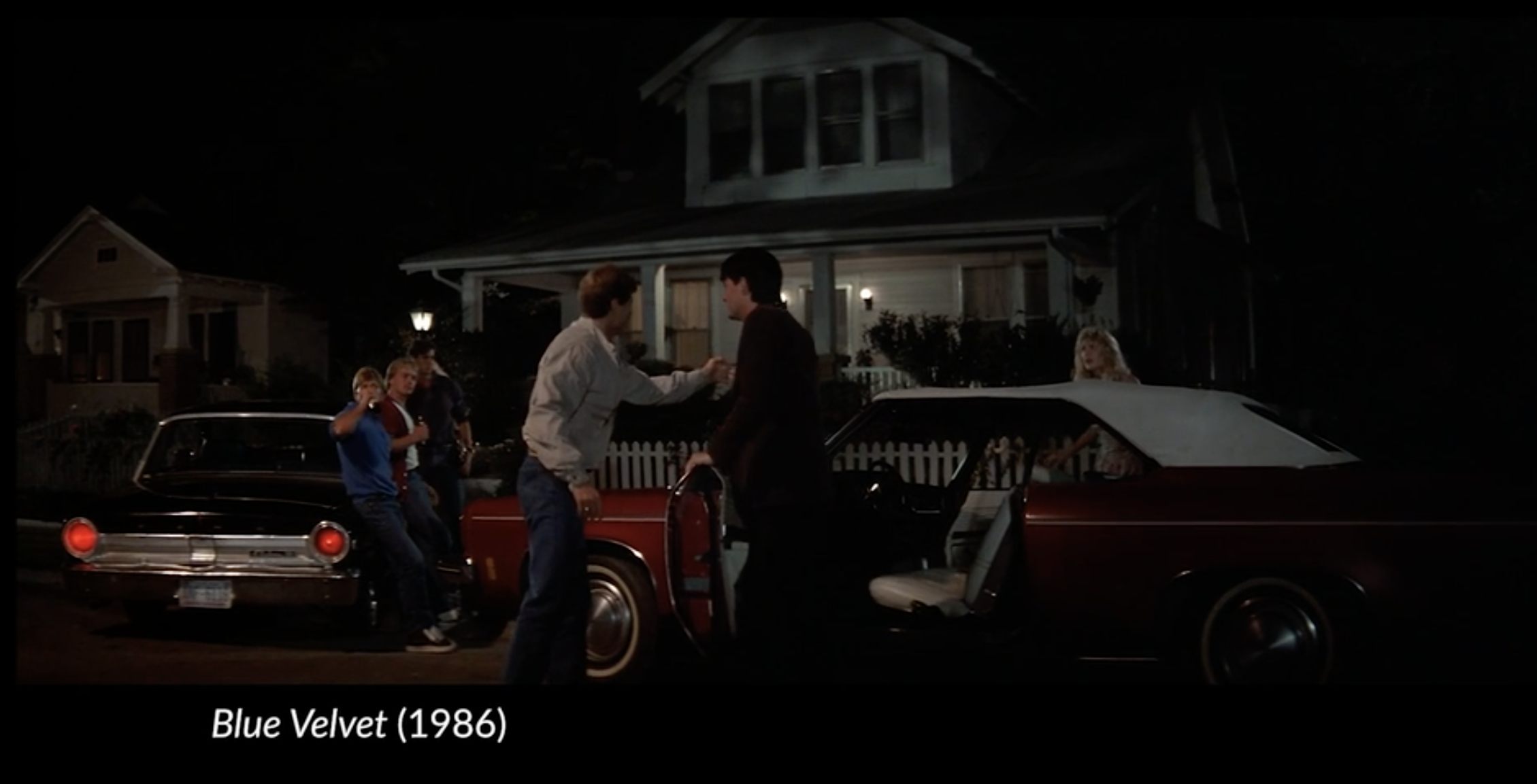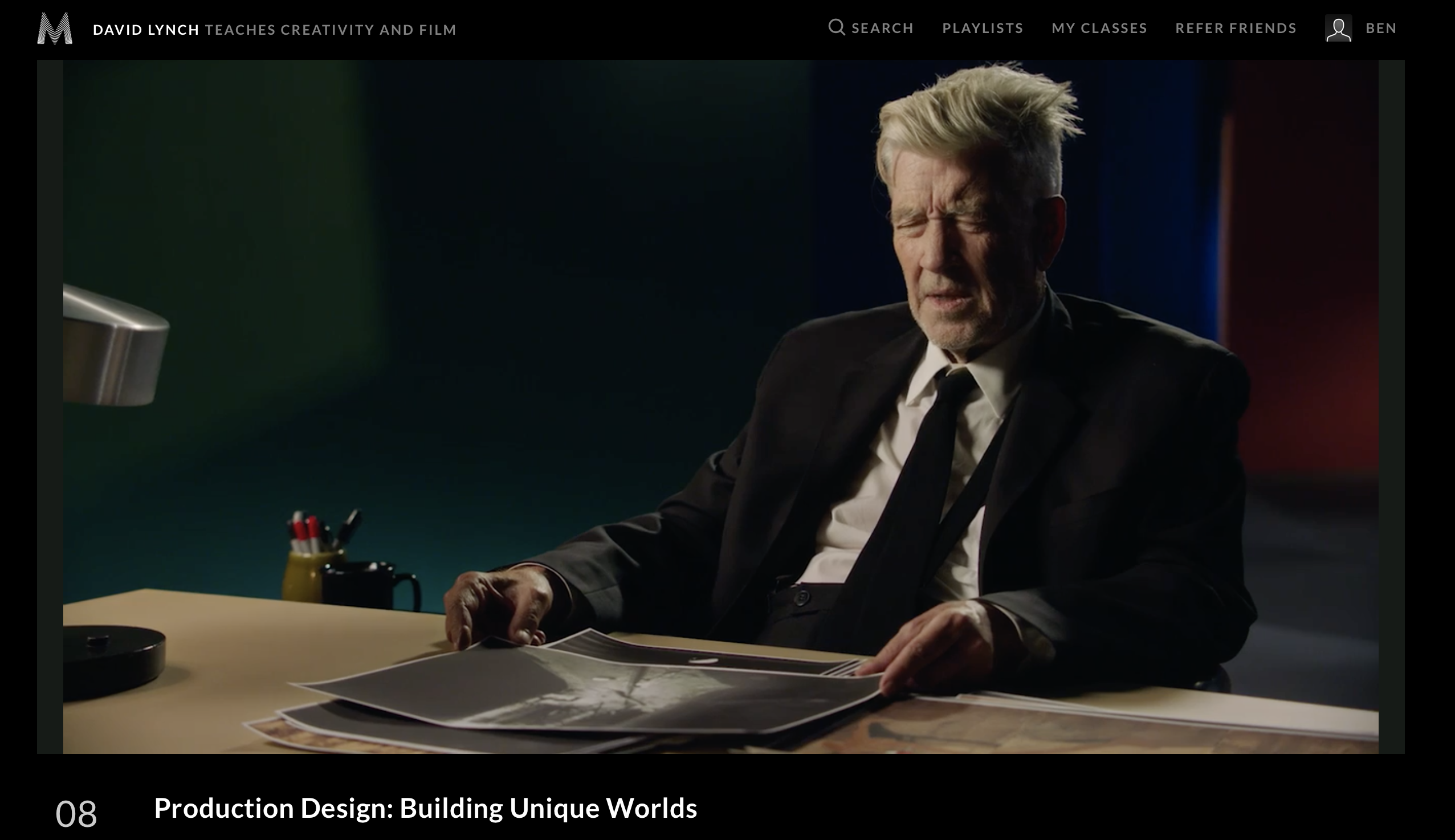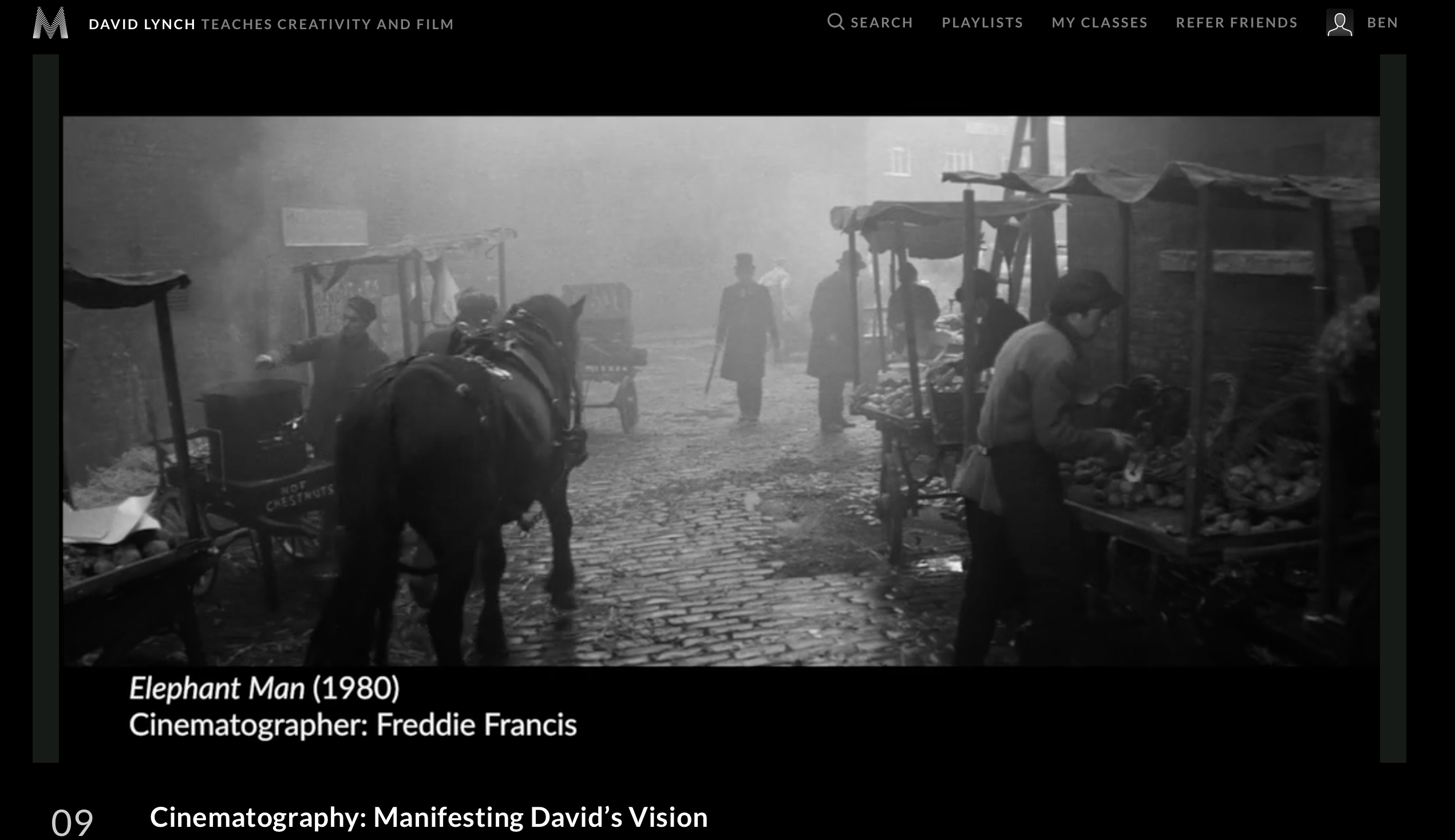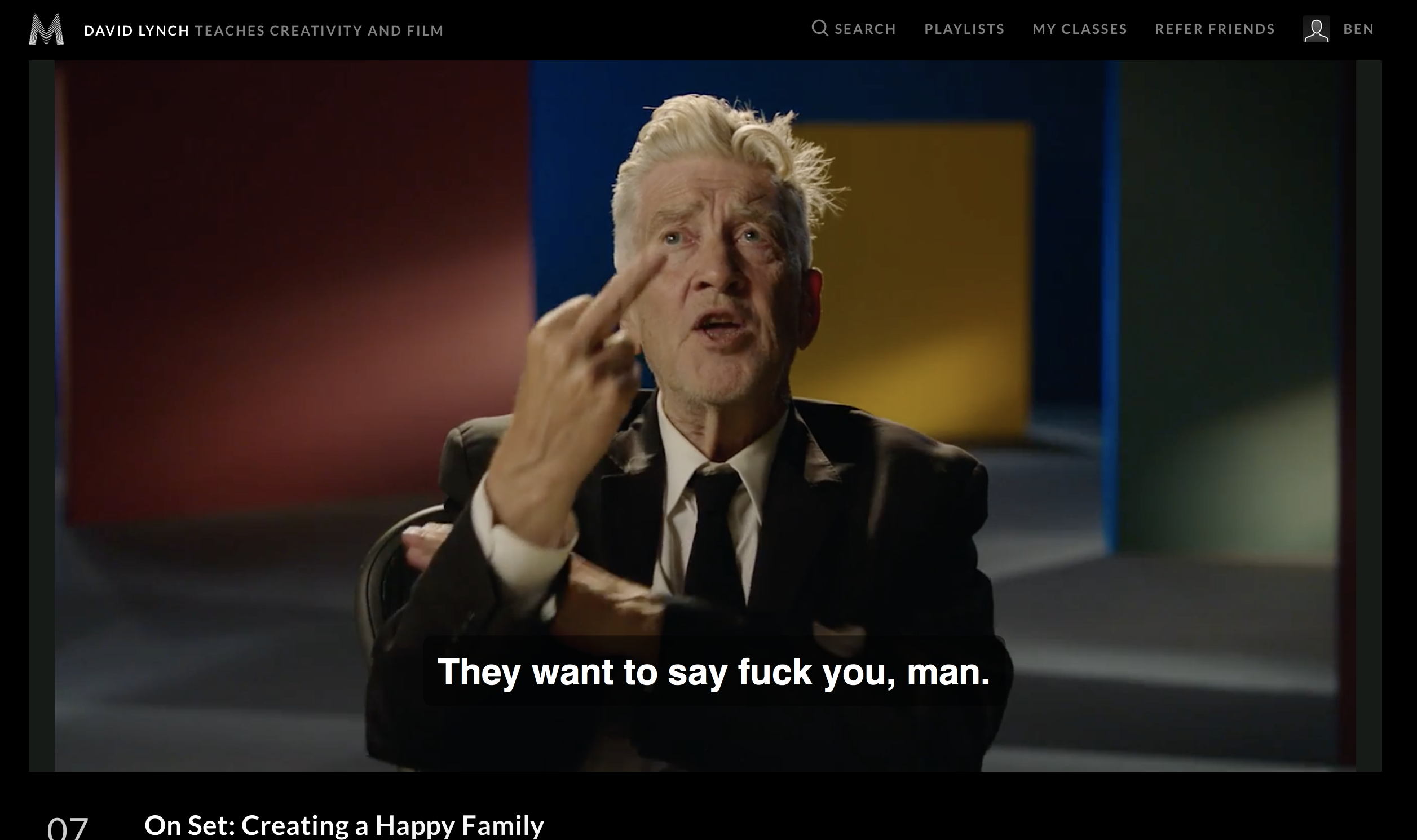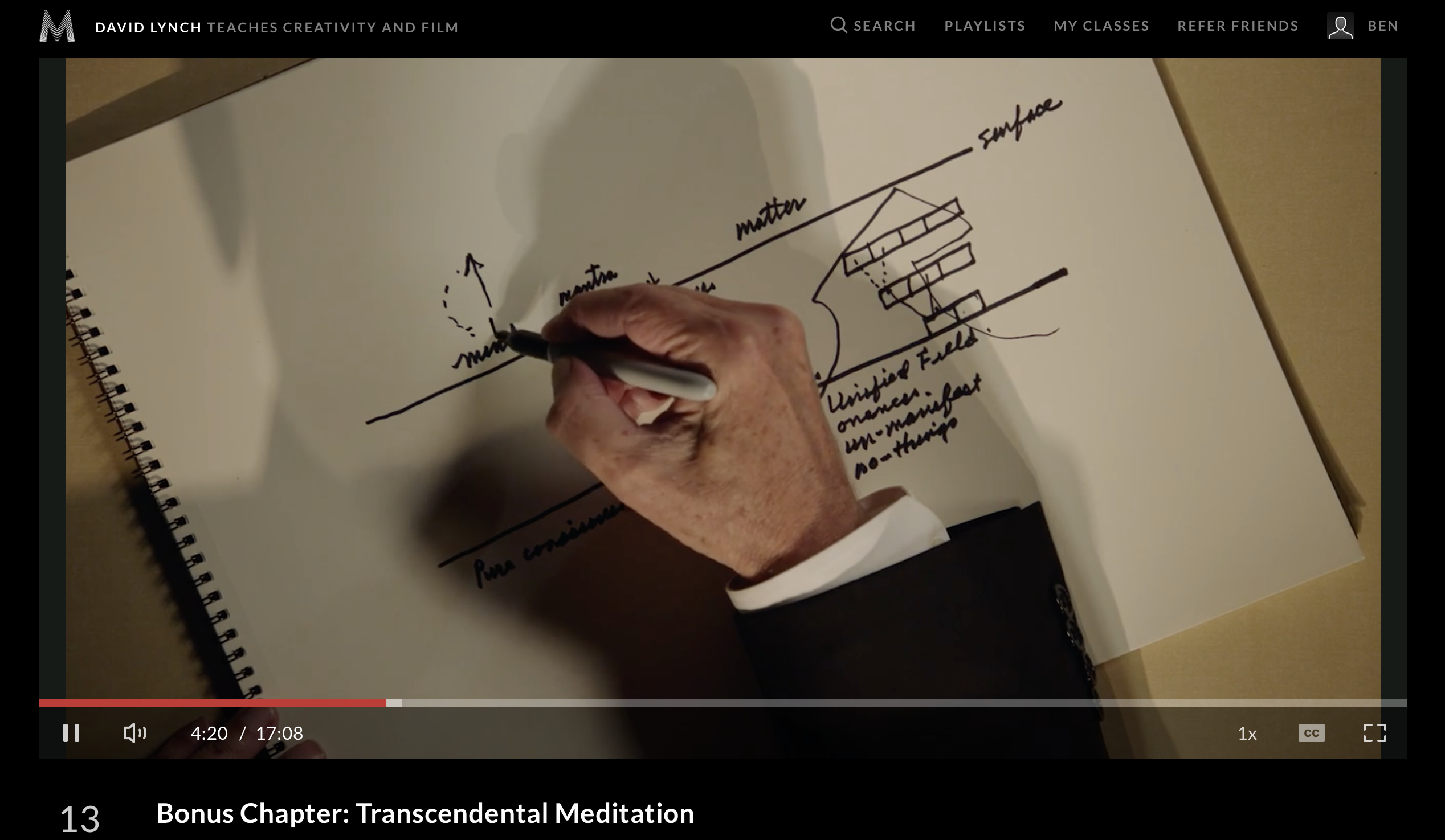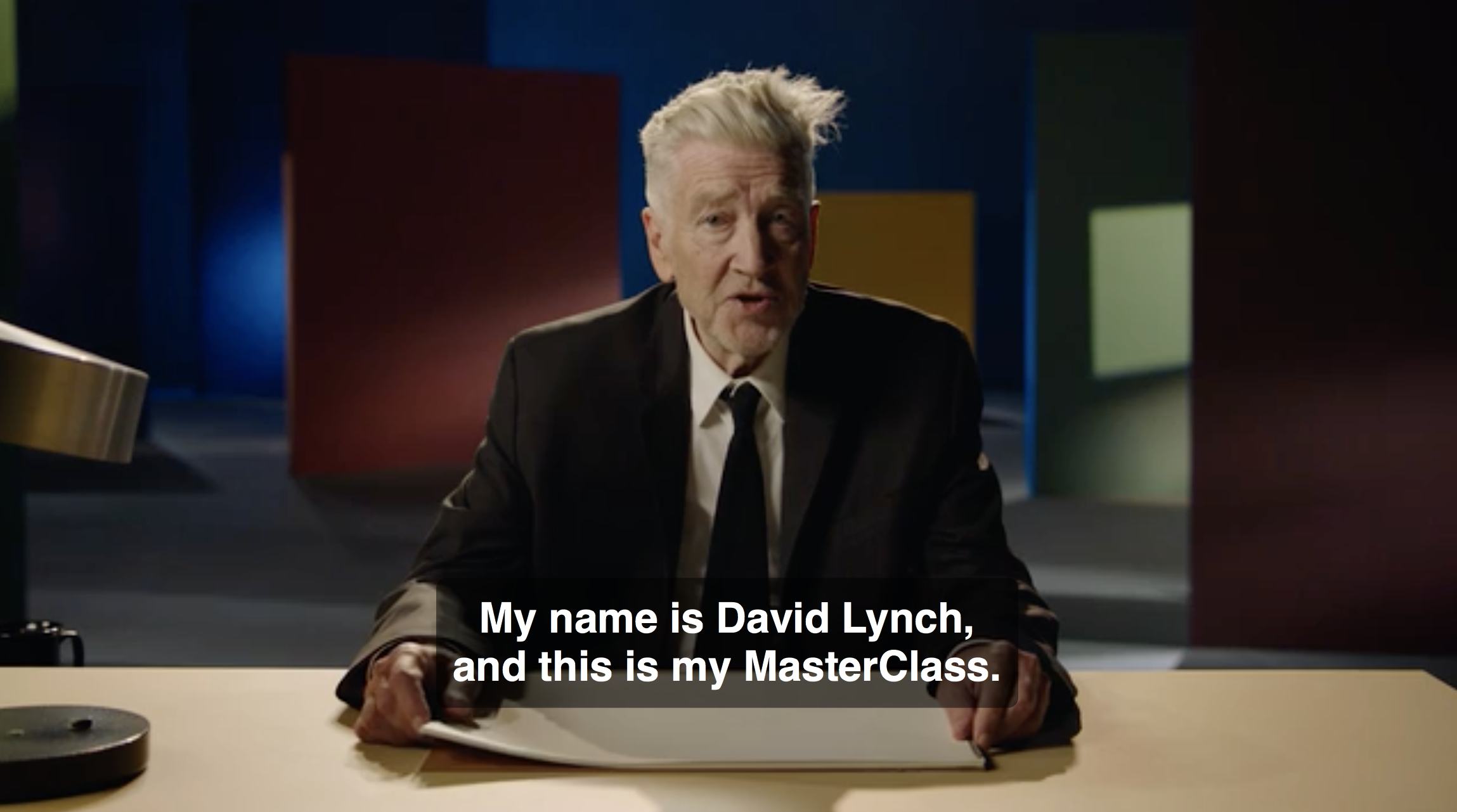The David Lynch MasterClass is freaking weird, man.
But you knew that going into it, didn’t you?
Would you expect anything less from the David Lynch who brought you the masterpieces of Twin Peaks, Blue Velvet, The Elephant Man, Mulholland Drive, Eraserhead, and so many more?
I’ve already taken a bunch of the film masterclasses thanks to my All Access Pass.
But the thing that interested me most about the David Lynch MasterClass when I saw it announced was the fact that it’s not just about film.
It’s about creativity.
Seeing as creativity is the primary reason I watched the other filmmaking masterclasses, I was happy to see this would be the focus here.
David Lynch Teaches Creativity And Film MasterClass Review
The first module, a long one, is all about catching ideas and I gotta say…
This is the weirdest, most surreal, most speaking-straight-to-the-heart-of-your-subconscious meditation on how to get ideas I have ever experienced.
Equal parts disorienting and inspiring, hypnotic and motivating.
I’ve read every book on the subject of ideas and listened to a lot of mentors and people I respect talk about ideas, but this is one of the most unique lessons on ideas I’ve encountered.
Then we get into a long fascinating module on the nature of creativity and the writing process from one who does not consider himself a writer (Lynch admits he can’t even spell – something I have in common with him) and one who does not go for the school-taught formulas of writing.
I gotta say that the David Lynch MasterClass is as genius as it is difficult to watch.
When it comes to the discussions on creativity, Lynch is most certainly evocative and motivational but I would have personally liked more practical tips and tools in the earlier parts of the course and I feel like the discussions become so abstract that I’m slowly descending into madness when watching this class.
Clearly, if you want to make the sort of avant-garde masterpieces that Lynch does, rather than something commercial, this will be right up you’re street and I’m sure it’s deliberate.
When it comes to Lynch’s tips of educating yourself, he goes broad with similar advice you’ll get from Werner Herzog, Martin Scorsese, or any great director really.
The practical stuff comes in the form of actual film analysis, with Lynch analysing films like Sunset Boulevard and Chinatown and movies by Frank Capra and Federico Fellini and commenting on the timing, character, and sense of place.
If you don’t get immense amounts of joy from sitting alongside David Lynch as he smokes cigarette after cigarette and sips coffee and breaks down Sunset Boulevard in the dark, you’re not a real film lover!
I particularly loved Lynch’s beautiful meditation on the phenomenon of films that end but still leave room to dream.
This is the first time I’ve ever taken an online course and felt stoned just by watching.
But you learn by osmosis and you end up dreaming about Lynch’s lessons.
I found this particularly true after the module on casting for characters and working with actors, which I watched before bed, and ended up having all these vivid dreams about selecting the right actors alongside Lynch who was directing me in how to do it.
In this module, like in all others, it’s best to keep in mind that it will serve you better if you’ve already seen much of Lynch’s oeuvre because you will watch clips from his movies alongside him and he uses them to reinforce the lessons he teaches.
You’ll still get a lot out of the class without watching his films, but why would you deprive yourself of that pleasure?
Bone up, have a Lynch marathon, then tuck into the masterclass.
Go back and watch Mulholland Drive.
Watch Blue Velvet.
Binge Twin Peaks again.
A module that really stood out to me was the one on how to create a happy family on set.
Obviously I’m not a filmmaker.
The reason I take these masterclasses is because film and creativity is a passion of mine and I love seeing how these great artists work.
But all of Lynch’s advice here was golden in regards to running a company, something that does apply to me, and I found myself taking a lot of notes and having a lot of different ideas sparked here.
I’m sure this module will be even more valuable for the filmmaker who is currently working on set or will do in the future.
Another module that really made me geek out was the one on production design and building unique worlds.
Watching clips of Eraserhead and Dune and Mulholland Drive or watching Lynch sketch out scenes from Lost Highway and then having Lynch dissect the environment with pictures was an absolute delight.
If you’re wondering how to get the worlds you see in your mind’s eye onto celluloid, you won’t want to miss this module.
We get right into the finer details of what is required in that process.
And this module also reminded me why I love Masterclass so much.
There are so many people this class would appeal to.
You don’t have to be a director, but you’ll love it if you are.
If you’re an actor, you’ll learn so much about how to work with directors and create a great performance.
But maybe you’re not an actor. Maybe you’re a set designer – well then this masterclass is worth its weight in gold for that too.
This is a masterclass in set design all on its own and I don’t know where else you’ll find something of this quality addressing this subject.
Or maybe sound design and scoring is your calling.
Well there’s a lot to dive into across all the filmmaking masterclasses when it comes to that (particularly the Hans Zimmer MasterClass) and Lynch certainly keeps the standard high in a module entirely dedicated to just that.
I also had a blast in the module on cinematography, especially as Lynch uses two of my favourite movies (The Elephant Man and Eraserhead) as case studies to teach us how to think cinematically.
This is where you get real insight into Lynch’s cinematic aesthetic (from his point of view) and you’ll almost certainly come away with thoughts for you own film (or whatever art you’re working on).
I filled a couple of notebook pages from this module alone.
If there is any module that’s a ‘must-watch’ in the David Lynch MasterClass, I’d say it’s actually one of the shortest ones.
Props to Lynch for making most of his modules long with a ton of rich information, but it’s the shortest module, on breaking the rules, that is essential for any artist.
You might not come away with any new perspective on your craft after viewing it, but I highly doubt it because I sure did and I’ve been immersed in my craft for years.
Everyone’s different but my personal favourite modules from the David Lynch MasterClass were on sound design and scoring (not my domain but I’m a huge music and movie buff and this was a magical experience that blew me away), creativity and the writing process (sparked so many ideas that I’m going to use, which is well worth the price of the course for me), the module on how to create a happy family on set, and the module on breaking the rules.
There’s also a very long bonus module all about transcendental meditation, which was a real delight.
If you’re looking for a new way into creativity and your unconscious, this looks like a good thing to explore (I haven’t yet, at least not seriously, but I will now).
How would I describe David Lynch as a teacher?
Honest.
Refreshingly honest.
High levels of artistic integrity with the ability to communicate them clearly.
Motivational, but definitely not in a pump-up way.
Lynch is the thinking-person’s motivator.
And ultimately hypnotic.
You’ll come away from the David Lynch MasterClass with your own vision.
Sure, you’ll learn about Lynch’s visions, but I believe he’s structured the class and speaks in the way he does deliberately to evoke a unique response from the viewer.
He might not be for everybody, but if he’s for you, then he will REALLY speak to you.
You can check out the David Lynch Teaches Creativity And Film MasterClass here.
